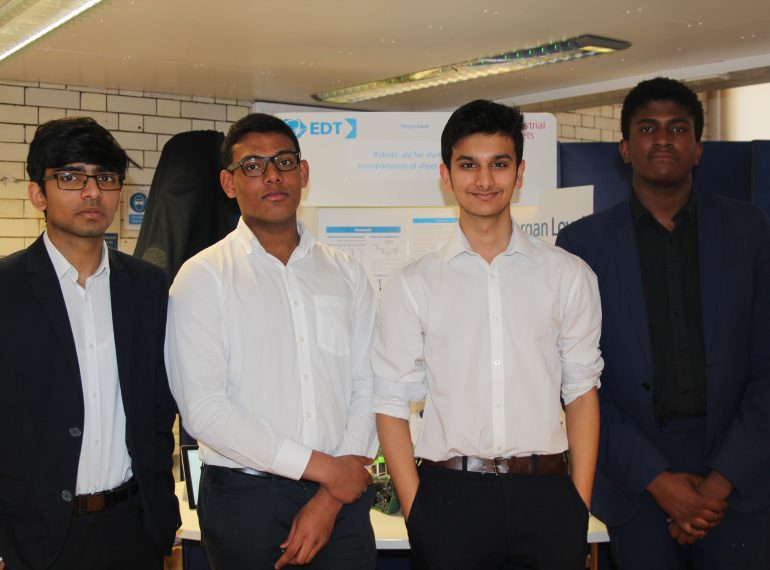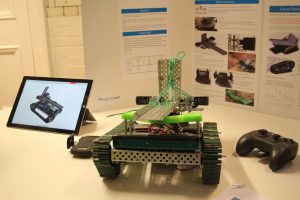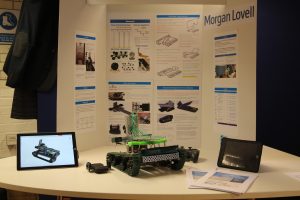
A QE Sixth Form team has been praised by independent judges after designing a robotic machine to tackle one of the major causes of long-term injury in the construction industry.
The four AS-level Technology students’ ingenious solution to the problem of transporting large sheets of material up staircases on construction sites was a robot with rubber caterpillar tracks.
 The project was Highly Commended in the Contribution to the Business Award at the Celebration and Assessment Day of the Engineering Excellence Scheme (EES).
The project was Highly Commended in the Contribution to the Business Award at the Celebration and Assessment Day of the Engineering Excellence Scheme (EES).
Their success follows the recent triumph of a team of younger QE boys who won a world title at the Vex IQ Challenge international robotics finals in the US.
Congratulating the sixth-formers, QE Technology teacher Tony Green said: “The EES assessors were really impressed with our boys’ ideas, praising their ‘great analysis of the existing Health & Safety issues and how they were solved by the solution’, as well as their ‘excellent application of a suitable mechanism’.” The judges lauded the team for differentiating their solution from existing robotic aids that are already available to move materials up staircases.
The EES, said Mr Green, is not a competition – the projects involved are too diverse for that – but the Contribution to the Business Award does allow the assessors to celebrate particularly strong project ideas.
The scheme pairs teams of senior pupils up with industry mentors. It aims to give them opportunities to experience the challenge of a career in Science, Technology, Engineering and Maths (STEM) and the fulfilment that such careers can bring.
 QE teamed up with construction company Morgan Lovell: Alex Woods, the firm’s Health and Safety Manager, and Delores Salgado, a Health and Safety Executive, served as mentors and provided the QE boys with a real-world engineering problem for them to resolve during the six-month project. Nathan Aderogba, Pranavan Gunaseelan, Chaitra Kawathekar and Kayman Krishnamohan were tasked with designing and testing a prototype that could autonomously or semi-autonomously lift large materials up flights of stairs.
QE teamed up with construction company Morgan Lovell: Alex Woods, the firm’s Health and Safety Manager, and Delores Salgado, a Health and Safety Executive, served as mentors and provided the QE boys with a real-world engineering problem for them to resolve during the six-month project. Nathan Aderogba, Pranavan Gunaseelan, Chaitra Kawathekar and Kayman Krishnamohan were tasked with designing and testing a prototype that could autonomously or semi-autonomously lift large materials up flights of stairs.
As part of their detailed research, the boys went on site visits to familiarise themselves with construction sites and see at first-hand the issues involved in lifting materials such as sheets of plasterboard, doors and windows up staircases.
The team looked at existing industrial equipment used for transporting large items both on level floors and on stairs. They studied staircase building regulations and standard sheet material dimensions and investigated various types of wheels, as well as different configurations for caterpillar tracks.
 Based on the results of this research, the boys held a brainstorming process in which several ideas were examined and then rejected, before they eventually chose and developed a design which involved sheets being clamped on to a carrying tray located on a turntable. This allowed sheets to be carried vertically, for narrower spaces, but also horizontally, giving greater stability. It used rubber caterpillar tracks, which not only provide good grip but also avoid damage to floors. The boys used kit robotics components from VEX Robotics. None had had previous experience of either programming or robotics.
Based on the results of this research, the boys held a brainstorming process in which several ideas were examined and then rejected, before they eventually chose and developed a design which involved sheets being clamped on to a carrying tray located on a turntable. This allowed sheets to be carried vertically, for narrower spaces, but also horizontally, giving greater stability. It used rubber caterpillar tracks, which not only provide good grip but also avoid damage to floors. The boys used kit robotics components from VEX Robotics. None had had previous experience of either programming or robotics.
They built a one-third-sized prototype, testing it on a similarly sized rig that included a miniature staircase. They presented this at the Celebration and Assessment Day, for which they were also required to:
- Prepare a full technical and business report
- Exhibit their project work
- Deliver a comprehensive 15-minute presentation on their solution to the panel of volunteer assessors sourced from local industry
- Respond to 10–15 minutes of detailed questioning by the assessing panel.
As a result of their successful participation in the scheme and the assessment day, the four boys were recognised as having graduated as Industrial Cadets at gold level.
